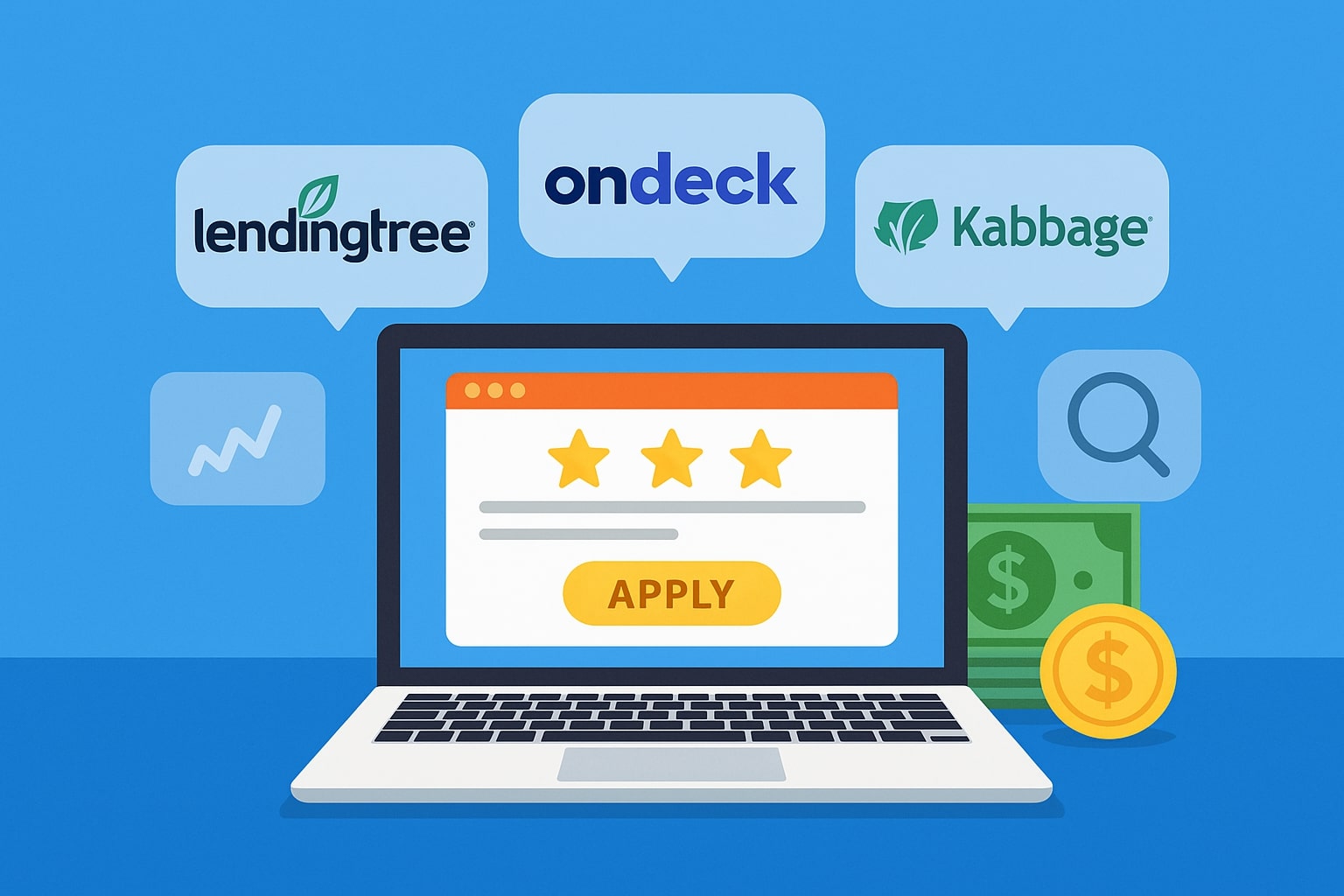
Top Online Lenders for Small Businesses (Compared)
Small businesses increasingly rely on online lenders to access capital faster than traditional banks. These fintech lenders offer unsecured loans, lines of credit, invoice financing (factoring), equipment loans and more – often via streamlined web applications and quick approvals.
In this comparison, we review the leading online lenders for small businesses in the USA, focusing on both unsecured business loans and other financing types (lines of credit, invoice financing, secured loans, etc.).
We analyze their products, rates, requirements, and customer ratings, citing up-to-date expert reviews and real-user feedback. Our aim is to provide a thorough, fact-based guide to help small business owners find the best online financing option for their needs.
Why Online Lenders? Speed and Flexibility
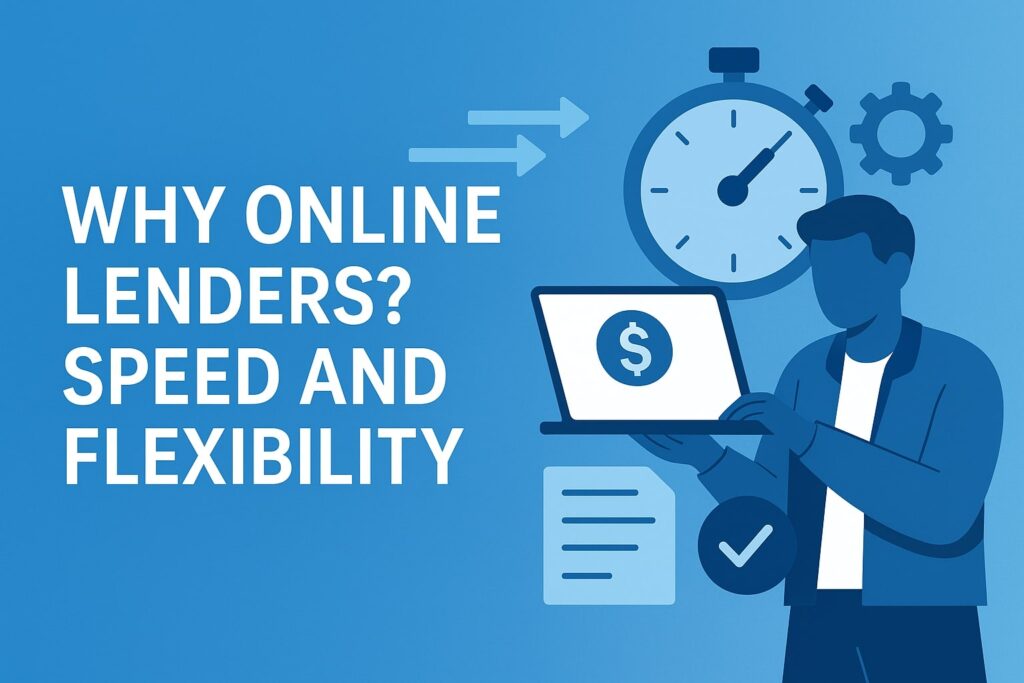
Traditional bank loans can be slow and require heavy paperwork, making them hard for many entrepreneurs to obtain. In contrast, online lenders use digital underwriting to speed up funding, often approving and disbursing loans in days or even hours.
For example, Bankrate notes that Bluevine can approve a credit line within 24 hours, and OnDeck can fund loans the same day you apply. These lenders also set simpler criteria: many look at business revenue and personal credit score rather than requiring assets as collateral.
The U.S. Small Business Administration (SBA) explains that an unsecured business loan is backed by the owner’s creditworthiness, not by collateral. This flexibility benefits owners who lack real estate or equipment to pledge.
In short, online lenders give small businesses rapid access to capital in exchange for higher rates and fees (to offset risk) compared to traditional loans.
Key advantages of online small-business lenders include:
- Fast funding – Many lend in 24–48 hours (or even hours) once approved.
- Simple application – Quick, web-based forms; often no or soft credit pulls for prequalification.
- Flexible criteria – Can accept younger businesses or lower credit with higher fees.
- Diverse products – Term loans, revolving lines of credit, invoice financing, etc., all online.
- High satisfaction – Surveys show online lending users report ~99% satisfaction, reflecting ease-of-use.
However, borrowers should weigh these perks against the cost: unsecured loans often charge high APRs. For example, OnDeck’s unsecured term loans start around 35.9% APR. But for many businesses, the fast access to cash (sometimes within hours) is worth the trade-off.
Types of Online Business Financing
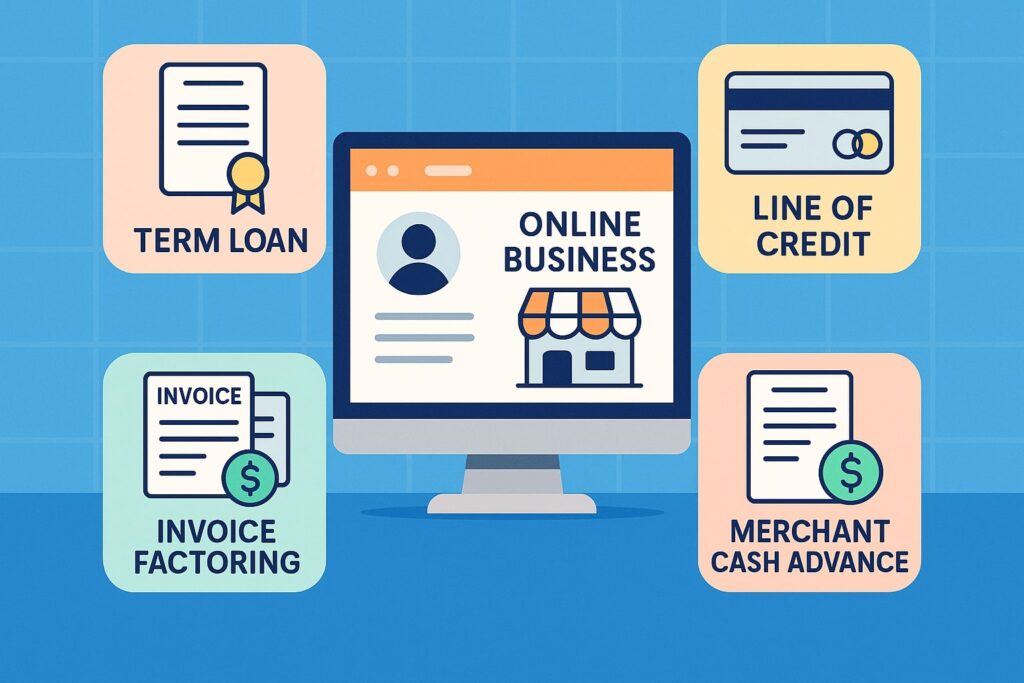
Online lenders cover virtually every loan type small businesses might need. Key categories include:
- Unsecured Term Loans: Lump-sum loans repaid on a fixed schedule. Approval is mainly based on credit and revenue. These are truly “no-collateral” loans and usually have higher interest.
The SBA notes unsecured loans rely on creditworthiness and may require a personal guarantee or business revenue-based model. - Revolving Lines of Credit: Like a business credit card, these allow repeated borrowing up to a credit limit. Lines give flexibility for ongoing cash needs.
As the SBA explains, a line of credit is “great for on-demand cash” and requires a strong credit history. Lines often have lower variable rates than term loans, but fees apply. - Invoice Financing (Factoring/Discounting): For B2B firms invoicing other businesses, lenders like Bluevine or OnDeck can advance cash against unpaid invoices. This isn’t a traditional loan – you’re effectively selling your invoices for immediate funds.
OnDeck explains “invoice factoring is not a loan; instead, you’re selling your accounts receivable to a factor”. Invoice financing can be approved very quickly (often <24 hours) and helps bridge cash-flow gaps. The invoice itself serves as collateral. - Secured Loans (Equipment, Commercial Real Estate, etc.): Some online lenders also make secured loans, using business assets as collateral.
For example, Lendio’s platform can match borrowers with equipment financing or SBA-guaranteed loans backed by business property. These tend to have lower interest but require collateral. - Merchant Cash Advances: While technically not loans, many online funders (like PayPal or Square Capital) offer advances repaid via a percentage of future sales. These are auto-deducted and often advertised as quick funding for POS merchants.
Below is a brief comparison of major online lenders and their products:
| Lender | Main Products | Loan/LOC Range | Minimum Credit/Requirements | Trustpilot Rating |
|---|---|---|---|---|
| BlueVine | Business Line of Credit; Invoice Factoring | LOC up to $250K; Term loans up to $500K | Personal credit ~625+, 24+ months in business | 4.3/5 |
| OnDeck | Term Loan; Line of Credit | Loan up to $250K; LOC up to $100K | Personal credit ~625+, 12+ months in business | 4.7/5 |
| Fundbox | Revolving Line of Credit | LOC up to $150K | Personal credit ~600+, 6+ months in business | 4.7/5 |
| Lendio | Loan Marketplace (term/SBA/equipment/etc.) | Varies (often up to $500K+ via partners) | Depends on lender matched | 4.7/5 |
| Credibly | Short-term Loans; Working Capital | Up to $600K | 6+ months in business, ≥$15K monthly revenue | 4.8/5 |
| Funding Circle | Business Term Loans | Up to ~$500K (depends on repayment ability) | ~2+ years in business, good credit (for best rates) | 4.6/5 |
| PayPal/Square | Merchant Advances (via sales) | $5K–$500K typical (automatically deducted by sales) | Linked merchant account, good sales history | See comments below |
Sources: We cite each lender’s published terms and third-party reviews above. For instance, BlueVine’s site advertises a line of credit up to $250K and OnDeck’s site shows loans to $250K plus lines to $100K.
Qualification examples: OnDeck only requires ~1 year in business and $100K revenue, whereas BlueVine’s line may require 2+ years and higher revenue.
Each lender’s customer ratings are shown in the table. Many of the top fintech lenders enjoy very positive reviews. For example, Lendio has ~4.7/5 stars on Trustpilot (21K+ reviews), OnDeck ~4.7/5 (4.9K reviews), Fundbox ~4.7/5 (4.1K reviews), and BlueVine ~4.3/5 (8.8K reviews).
(By contrast, traditional banks often lack such public ratings.) Moreover, several fintechs are BBB-accredited at A+. For example, BlueVine, OnDeck, Lendio and Credibly all have A+ Better Business Bureau ratings.
Comparing Key Lenders in Detail
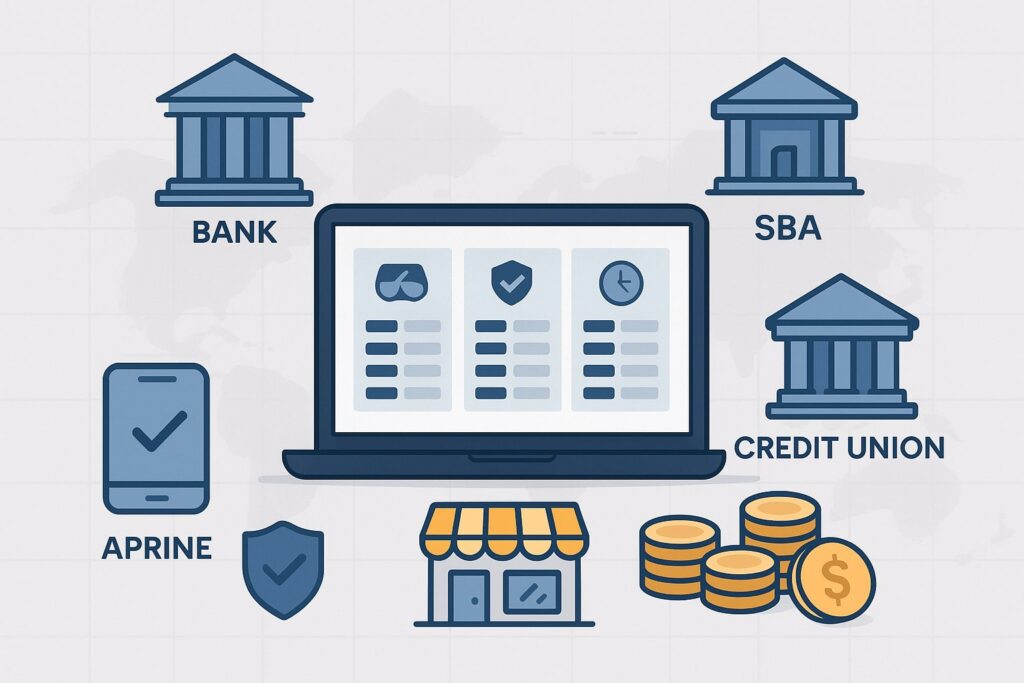
Below we highlight each major online lender’s offerings, requirements and review highlights.
BlueVine – Fast Lines and Invoice Factoring
BlueVine has become a leading fintech bank for small businesses. It offers both a Line of Credit (revolving credit up to $250,000) and term loans (up to $500,000 through partner banks). BlueVine’s business line can fund very quickly, and Bankrate notes it “focuses on… lines of credit up to $250K” with interest “starting at 7.80%”.
Applicants generally need a personal FICO in the mid-600s and a couple years in business. For instance, Bankrate reports the 12-month BlueVine line requires ~2 years in business and $480K annual revenue.
BlueVine also provides invoice financing – a type of secured credit where outstanding invoices serve as collateral. Invoice financing “enables you to get a cash advance on unpaid invoices”. This can be valuable for B2B firms; BlueVine notes invoice financing is fast (often approved within 24 hours).
(Note: invoice financing is technically not a loan but the sale of receivables.) Overall, BlueVine borrowers praise the convenience. BlueVine carries an A+ BBB rating and a 4.3/5 Trustpilot score, indicating generally positive experiences.
OnDeck – Term Loans and Revolving Credit
OnDeck is one of the oldest and largest online small-business lenders (founded 2006). It offers short-term Term Loans (up to $250,000) and Lines of Credit (up to $100,000).
- A key strength is quick access: OnDeck advertises that lines fund “instantly” and term loans can fund the same day. Bankrate highlights OnDeck as “Best lender for startups” since it accepts businesses with just 1 year of history and $100K revenue.
- OnDeck’s requirements are moderate: typically a minimum 625 personal credit score, at least 1 year in business and $100K+ revenue. It also only does soft credit checks at prequalification (“no hard credit pulls”), which means checking rates won’t hurt your score.
- OnDeck’s APRs are high: Bankrate notes they start around 35.9% APR on term loans (though lines of credit can have lower variable rates). OnDeck holds an A+ BBB accreditation and enjoys excellent reviews: Trustpilot ~4.7/5 and many user testimonials praise its fast, friendly service.
Fundbox – Flexible Short-Term Credit
Fundbox specializes in short-term credit lines. Its main product is a revolving line of credit up to $150,000. Fundbox’s interest is charged daily (starting as low as 4.66% per “draw”), with no prepayment penalties.
- It offers particularly accessible underwriting: only ~6 months in business and $100K/year are required, and a personal credit score ~600 or above.
The application is very easy and fully online. Bankrate notes Fundbox “specializes in lines of credit up to $150K” and qualifies very young businesses. - Users generally rate Fundbox highly: it carries an A+ BBB rating and an “excellent” 4.7/5 on Trustpilot. Customers like the convenience of instant decisions and 24/7 draws on the credit line.
- The tradeoff is the cost: because Fundbox is so flexible, its implied APR can be quite high. (UnitedCapitalSource notes Fundbox’s high rates and recommends it mainly for those who can generate quick profit from the funds.)
Lendio – Marketplace of Lenders
Lendio is not a direct lender but a marketplace/platform that connects small businesses to 75+ lenders. Through one application, Lendio matches you with possible loan offers – ranging from term loans and lines of credit to SBA loans, merchant cash advances, and equipment financing.
This broad approach can uncover options both from fintechs and from traditional banks. For example, Lendio lists access to SBA 7(a) loans (up to $500K+) for qualified borrowers.
Because Lendio is a facilitator, its terms vary by the funding partner. Qualifications are lender-dependent. However, Lendio’s service is well-regarded: it holds an A+ BBB accreditation and has 4.7/5 stars on Trustpilot (21K+ reviews).
Review sites note that borrowers appreciate Lendio for fast prequalification and personalized matches to both big banks and alternative lenders.
Credibly – Working Capital and Quick Approval
Credibly offers short-term working capital loans (revenue-based loans) and merchant cash advances up to $600,000. Its business loans come with factor rates (e.g. 1.11×) rather than traditional APRs, and terms from 6–24 months.
Credibly’s underwriting is quite flexible: it requires only 6+ months in business and about $15,000 in monthly revenue. Notably, it accepts personal credit scores as low as 500. Credibly emphasizes speed: one review notes applicants can be approved in as little as 4 hours and funded the same day.
Credibly is BBB-accredited A+ and has a high Trustpilot score (~4.8/5). However, its effective costs are high (factor rates), so it suits urgent needs. It’s a good fit for businesses that might not qualify for bank loans and need cash fast.
Other Online Financing Options
- Payment Processors (PayPal, Square, Amazon Lending): Merchants can get cash advances from payment services. PayPal Working Capital lends based on your PayPal sales history (fixed fee repaid via sales).
Square Capital is similar for Square users. These are quick for qualified sellers. For example, LendingTree notes PayPal’s loans are convenient for PayPal-using businesses. However, they require strong platform sales and are repaid via future revenue shares, not fixed installments. - Big Banks with Online Portals: Traditional banks (Chase, BofA, Wells Fargo, etc.) now offer online applications and small-business loans.
For example, BofA’s Preferred Rewards can get lower rates, and Wells Fargo offers SBA and business lines online. These can have better rates, but often slower approval and stricter credit requirements. - Other Lenders: Fora Financial (and its subsidiary Kapitus) offers large short-term loans and even takes low credit (~570+). For low-revenue startups, Headway Capital and Credit Plus (formerly Merchant Advance Capital) provide fast term loans. Each has niche qualification criteria.
In summary, the landscape is broad. Fintech platforms like BlueVine, OnDeck, Fundbox, and Credibly dominate for fast unsecured funding, while marketplaces (Lendio, Nav) include many bank/lender products. Reputable providers have high ratings and BBB accreditation, reflecting generally strong customer trust.
What to Look for in an Online Lender
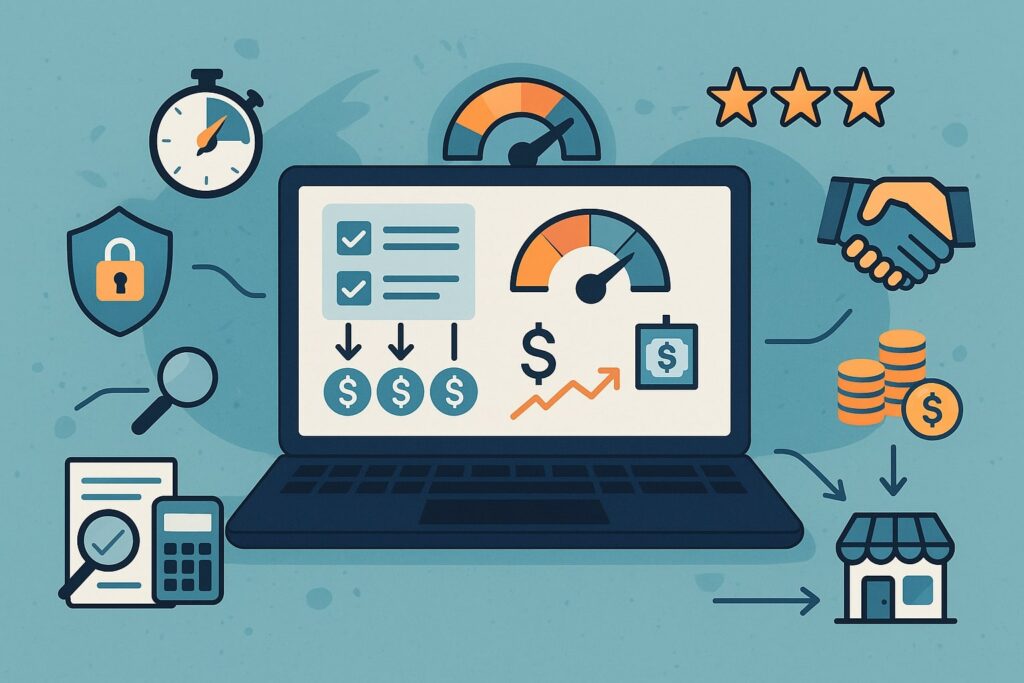
When comparing online lenders, key factors include:
- Rate and Fees: Compare APRs or factor rates. Unsecured loans are expensive: e.g. OnDeck starts ~35.9% APR. Lines or invoice financing can be cheaper. Watch out for origination or maintenance fees.
- Funding Speed: How fast do you need cash? Some lenders (OnDeck, Credibly) can fund same-day. Others take a few days.
- Qualification Requirements: Check credit, revenue, time in business. For instance, BlueVine’s 12-month line needs 2+ yrs and $480K revenue, whereas Fundbox needs only ~6 months and $100K. Align with your business profile.
- Loan Terms: Evaluate term length and payment structure. Lines are revolving vs. term loans have fixed schedules. Invoice financing has no fixed repayment (you repay as customers pay).
- Flexibility: Some lenders allow paying off early without penalty, which can save on interest.
- Customer Service: Look at reviews on Trustpilot or BBB. Highly-rated lenders (BlueVine, OnDeck, Fundbox, Credibly) often offer responsive support.
- Transparency and Security: Ensure the lender is reputable (BBB accreditations, clear terms, etc.). Use only well-known platforms to protect your information.
A simple way to start is with a marketplace like Lendio or Nav to compare offers. They pre-screen many lenders and show you rates without a credit hit. From there, you can drill into the best matches.
Customer Feedback and Ratings
Customer reviews provide real-world insight. Major online lenders generally have strong ratings:
- BlueVine: A+ BBB; Trustpilot ~4.3/5 with ~8,800 reviews. Reviewers often praise its ease of use for lines of credit.
- OnDeck: A+ BBB; Trustpilot ~4.7/5 (4.9K reviews). Users highlight its fast funding and good customer service.
- Fundbox: A+ BBB; Trustpilot ~4.7/5 (4.1K reviews). Appreciated for flexible credit, but some mention high cost.
- Lendio: A+ BBB; Trustpilot ~4.7/5 (21K+ reviews). Customers like the broad lender network and transparent process.
- Credibly: A+ BBB; Trustpilot ~4.8/5 (1.1K reviews). Fast funding is a plus, albeit some note high fees.
- Funding Circle: Not BBB-accredited, but has ~4.6/5 on Trustpilot (15K+ reviews), with many satisfied borrowers.
- Others: Fora Financial (bad credit lender) has lower user ratings but is noted for accepting very low credit.
An industry survey found 99% of small businesses said they were satisfied with online lender experiences. This suggests that for many owners, the convenience and speed outweigh the extra cost. Always cross-check any lender’s online reviews and BBB records as part of your research.
How to Choose the Right Lender
- Identify Your Needs: Determine how much you need and for what (short-term cash flow, equipment purchase, etc.), and how fast. For example, lines of credit are ideal for ongoing cash flow, whereas term loans suit one-time investments.
- Check Eligibility: Make a list of lenders matching your business size, credit profile and industry. Note each lender’s minimum requirements. (For instance, if you have under 2 years in business, skip lenders requiring 24+ months.)
- Compare Costs: Use a calculator to translate interest rates or factor rates to APR. For example, a factor rate of 1.11 on a 6-month loan is roughly 46% APR, whereas lines quoting “6.66%” daily interest can be ~60% APR.
We note: OnDeck term loans start at ~35.9% APR, Fundbox’s low quoted rate (4.66%) actually translates to a very high APR when annualized. - Review Terms Carefully: Look for prepayment penalties or hidden fees. The SBA notes unsecured loans avoid collateral but charge higher rates, so ensure you won’t be overpaying unnecessarily.
- Factor in Timing: If you need funds today, prioritize lenders advertising same-day funding. If you have a week, you can shop around more.
- Check Reputation: Read Trustpilot/BBB. Even top lenders have occasional complaints, so read reviews to spot patterns (e.g., good support, harsh debt collection, etc.). The references above provide some publisher ratings.
- Apply Simultaneously (if needed): You can pre-qualify with multiple lenders (often via a soft pull) to compare offers without harming your score.
By systematically comparing offers (weighing rate vs. speed vs. approval odds), you can select the lender that best fits your situation.
For example, a startup may prioritize ease and accept a higher rate (OnDeck or Credibly), whereas an established firm might shop around for the lowest rate or use Lendio to tap bank alternatives.
Frequently Asked Questions
Q: What is an online business lender?
Answer: An online lender is a financial company (often a fintech or “alternative” lender) that offers loans via an internet-based platform. Unlike traditional banks, online lenders typically use automated systems to underwrite loans.
They can include peer-to-peer lenders, fintech companies, or even credit card networks (like Square) that fund small business loans. Online lenders may offer term loans, lines of credit, invoice financing, and more – often faster and with less paperwork than banks.
Q: How do online lender requirements differ from banks?
Answer: Many online lenders focus on revenue and credit profile, rather than collateral. For example, BlueVine requires around $480K/year and 2+ years in business for its line, whereas banks might require stronger financial statements.
Conversely, some online lenders accept younger businesses or lower scores: OnDeck needs just 1+ year and 625 FICO, Credibly needs 6+ months and $15K/month, and Fora Financial can even take scores as low as 570.
In general, borrowers with stronger credit and longer histories can get better rates even online; those with weaker profiles can still often get funded, but at higher cost.
Q: What is the difference between secured and unsecured loans?
Answer: Unsecured loans require no collateral; the lender relies on credit and revenue. They are easier to qualify for but have higher interest. Secured loans are backed by assets (receivables, inventory, real estate, etc.), allowing lower rates.
Invoice financing is partly secured (the invoice is the “collateral”). Collateral-based loans (like equipment financing or SBA loans) typically offer lower rates but take longer to approve and may have stricter terms.
Q: How fast can I get funds?
Answer: Funding speed varies. Top fintech lenders can be extremely quick: OnDeck and Fundbox boast instant or same-day funding on approved lines.
Credibly claims approvals in as little as 4 hours. BlueVine often funds within 24–48 hours. Even slow-approving online lenders usually fund faster than banks (few weeks). If you need cash urgently, prioritize those advertising “fast” or “same-day” funding.
Q: Are customer reviews and Trustpilot scores reliable?
Answer: While no source is perfect, Trustpilot and BBB ratings can be useful signals of customer satisfaction and trust. We found that most leading online lenders have very good scores (4+ stars). For instance, Trustpilot shows Lendio 4.7/5 (21K+ reviews), OnDeck 4.7/5 (4.9K), and Credibly 4.8/5 (1.1K).
The SBA survey mentioned earlier even found 99% of borrowers were satisfied with their online lender experience. Nonetheless, read recent reviews for any red flags (like unexpected fees or poor service). Also consider BBB accreditation: lenders like BlueVine, OnDeck, Lendio and Credibly are BBB-accredited A+, which adds confidence in their legitimacy.
Q: Is invoice factoring a loan?
Answer: No – invoice factoring isn’t a traditional loan. Instead, you sell your unpaid invoices to a factor (third-party financing company) at a discount. The factor gives you most of the invoice value upfront (e.g. 80–90%) and collects the invoice payment from your customer.
OnDeck explicitly states “invoice factoring is not a loan. Instead, you’re selling your accounts receivable to a third party”. Factoring can be easier to qualify for (since it is backed by customer invoices) and provides quick cash, but you end up receiving less total proceeds than the invoice’s full value.
Q: How does an online line of credit work?
Answer: A line of credit (LOC) is like a credit card for your business: you have a maximum limit and can draw money as needed. Interest only accrues on the amount drawn. Lenders like BlueVine and OnDeck offer revolving LOCs (e.g. $250K or $100K limits).
You can repay and borrow again. Lines are excellent for ongoing expenses because you only pay interest on what you use. Approval for a LOC often requires checking revenue and credit history (the SBA advises having good credit and some time in business for an unsecured line).
Q: What credit score do I need for a small business online loan?
Answer: Requirements vary. Some lenders are surprisingly lenient: Credibly will consider scores as low as 500, and Fora Financial takes ~570+. But most major lenders expect at least a fair score (~600–650).
For example, OnDeck’s site shows a 625+ requirement, and Fundbox requires ~600. Higher scores (700+) will get you better rates. If you’re on the lower end, you may still qualify via a revenue-based model, but plan to pay more for it.
Q: Are online lender applications safe?
Answer: Reputable lenders use secure websites and do proper identity verification. Many are highly regulated or partnered with banks (BlueVine is FDIC-insured via partner banks).
Always check for “https://” in the address bar, and confirm BBB accreditation or established reviews. Fraudulent “lenders” do exist, so only work with well-known companies or those reviewed by trusted sites. Using intermediaries like Lendio can add a layer of vetting as well.
Conclusion
Online lenders have transformed small business financing by making capital more accessible and faster to obtain. Unsecured financing, through short-term loans or revolving credit, is now readily available to qualified businesses, often with minimal paperwork. Meanwhile, options like invoice financing and equipment loans provide tailored secured funding.
In comparing top providers, we see that each has strengths: BlueVine and Fundbox excel in lines of credit, OnDeck in quick term loans, Credibly in flexible working capital, and Lendio in marketplace breadth.
Trust and satisfaction are generally high in this space – most leading lenders maintain A+ BBB ratings and 4+ Trustpilot scores. That said, costs remain significantly higher than banks, so borrowers must carefully compare APRs and fees.
Key criteria are your speed needs, loan size, credit profile, and industry. For a quick recap:
- If you need money fast (same day) for general expenses, OnDeck or Credibly are top picks.
- If you need an ongoing credit line at a competitive rate, BlueVine or Fundbox are excellent.
- If you want to explore bank options like SBA loans, use a marketplace (Lendio/Nav) to see multiple offers.
Always start by checking your eligibility (most sites allow a soft pull or simple quote) so you can compare without commitment. We hope this guide – with up-to-date facts and third-party ratings – helps you make an informed choice among the top online lenders for small businesses.